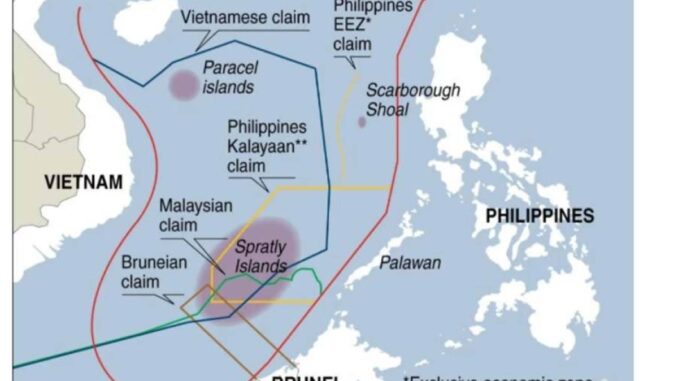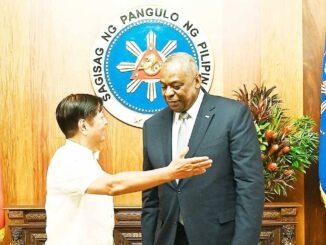
JAPAN and the United States have expressed support for the Philippines’ “consistent efforts” toward a peaceful settlement of disputes in the South China Sea (SCS), the Japanese Embassy in Manila said on Tuesday.
Tokyo and Washington conveyed their support during the inaugural Japan-Philippines-US trilateral maritime dialogue on Dec. 10 held in Tokyo.
They exchanged views on the recent developments in the SCS and “reaffirmed their opposition to any unilateral attempts to change the status quo by force,” the Japanese Embassy said.
Contested waters in the South China Sea. AFP Photo
In a statement, the Philippines Department of Foreign Affairs (DFA) said that the dialogue was a “significant milestone in demonstrating the deepening cooperation of the Philippines, Japan, and the US on maritime concerns.”
They reiterated their “enduring commitment to uphold a free, open and secure Indo-Pacific through the rules-based international order that adheres to international law, particularly Unclos (United Nations Convention on the Law of the Sea) and the 2016 arbitral ruling” favoring the Philippines.
The Permanent Court of Arbitration in July 2016 invalidated China’s expansive claim in the South China Sea that overlaps with the Philippine exclusive economic zone (EEZ).
Nakamura Ryo, assistant minister/director-general of Southeast and Southwest Asian Affairs Department of the Ministry of Foreign Affairs, chaired the dialogue while Dr. Mira. Rapp-Hooper, special assistant to the president, led the US contingent.
Maria Theresa Lazaro, DFA undersecretary of bilateral relations and Asean Affairs, led the Philippine delegation.
The trilateral delegations were assisted by their respective defense and coast guard officials.
At the conclusion of the dialogue, Lazaro announced the Philippines’ willingness to host the Second Trilateral Maritime Dialogue in 2025, the DFA said.
Meanwhile, the Japanese Embassy in Manila said that Nakamura, Rapp-Hooper, and Lazaro “confirmed their commitment to strengthening cooperation among three countries as natural partners and maritime nations linked together by the Pacific Ocean.”
During the dialogue, the US, Japan and the Philippines discussed regional maritime issues, the US Department of State said.
“They expressed serious concerns about China’s dangerous and unlawful behavior in the South China Sea — including the repeated blocking and harassment of Philippine vessels from operating within the Philippines’ exclusive economic zone — behavior that threatens the freedoms of navigation and overflight of all nations,” the State Department said.
They also reaffirmed their commitment to upholding international law as reflected in the 1982 Law of the Sea Convention.
Also, the three countries discussed opportunities to “strengthen future trilateral cooperation and engagement with other partners through maritime cooperative activities, combined trainings, maritime law enforcement and coast guard capacity building,” it added.
Japan and the US reiterated their expectation that the parties to the disputes would comply with the 2016 Arbitral Tribunal award as to the disputes between the Philippines and China in the SCS, “thereby leading to peaceful settlement of disputes.”
Further, the trilateral dialogue had open and dynamic discussions on strategic perspectives on regional maritime issues, institutionalizing trilateral cooperation, and future policy plans, among others.
They agreed that the trilateral maritime dialogue will “serve as a durable foundation for coordination and cooperation in addressing challenges and complexities of the regional maritime landscape.”
The inaugural trilateral maritime dialogue was an outcome of the first-ever Philippines-Japan-US trilateral summit held last April 2024.
In April, US President Joe Biden, Japanese Prime Minister Kishida Fumio, and President Ferdinand Marcos Jr. met at the White House for the first trilateral Leaders’ Summit, where they committed to deepening cooperation across sectors, including maritime security, to advance a shared vision for a free and open Indo-Pacific region.
“At the summit, our leaders announced a new trilateral maritime dialogue to enhance coordination and collective responses,” the State Department said.





Be the first to comment